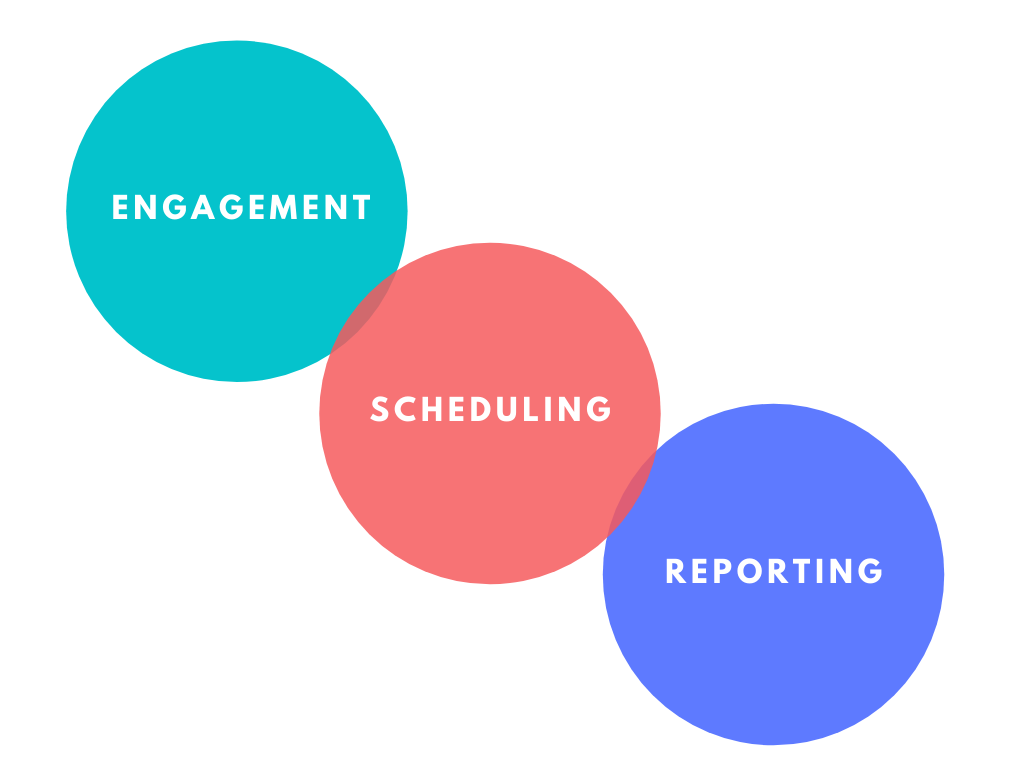Social media can be a powerful tool for businesses, and its importance within marketing and sales strategies continues to grow. It can be used for finding new customers, driving traffic to a brand’s website, communicating with existing and potential customers, benchmarking competition, keeping an eye on new trends, and more. However, to run social media properly, companies need the right tools. Social media management platforms have been designed to help brands automate, analyze, engage, report, and manage their social media accounts.
These platforms take control of posting updates on social media networks, identify the best performing content, most effective time to post, and more. This allows social media teams to focus on creating content and ensuring their audiences are informed. Today, we want to dive into what social media management is and outline some of the most reputable tools to give you a better understanding of the market.
Today we will answer the following questions:
- What is social media management?
- What are its main functionalities?
- What are some of the best tools?
Let’s get started.
What is Social Media Management?
As social media has become an increasingly important part of business structures, the need for effective management has arisen. Social media management is a concept as well as a type of software platform that enables brands to make the most of their social media networks. We can define social media management as:
The process of analyzing social media audiences and developing a strategy that’s tailored to them, creating and distributing content for social media profiles, monitoring online conversations, collaborating with influencers, providing community service, and monitoring, measuring, and reporting on social media performance and ROI.
Socialbakers
Now, to accomplish all of these tasks lined out, companies rely on technology to help automate, streamline, and improve their social media efforts. Social media management tools were developed to address all of these business needs. These tools are usually cloud-based SaaS platforms that vary in price, functionality, and specialty (agencies, small businesses, large enterprises, etc.)
Social media management platforms allow marketing, social media, and communications teams to increase brand awareness, engage with their online audiences, and manage workflows. These tools can be used to create content to use across social media networks as well as in marketing campaigns.
The job of these platforms is to increase inbound traffic, customer engagement and satisfaction, customer conversion, and to grow and maintain an online presence. These tools often provide features of social media monitoring and social media analytics within their platforms. These tools can be standalone products or an integrated feature in a larger suite solution such as marketing automation.
What are its Main Functionalities?
Social media management systems are designed to help users get the most from their social channels and simplify and streamline their processes. Social media management tools offer a wide variety of “nice to have” functionalities, and each platform differs. However, there are three core functionalities that a social media management platform should have: engagement, scheduling, and reporting. These functions allow users to get the full scope of their social media platforms and manage them effectively from one single platform.
- Engagement: An engagement system usually serves as a dashboard where you can monitor all social networks and respond and interact with your audience whether it be comments, mentions, private messages, etc. There are two main displays for engagement functions: “streams” which serve as a sort of newsfeed and what you can see at Hootsuite, or “inbox” which looks something like an email inbox, which can be seen at AgoraPulse and Sendible. This allows users to see directly the interactions that need attention, and gives an opportunity to connect with their audiences directly.
- Scheduling: The scheduling functionality allows users to schedule and automate the posting of their content over various social media channels.
- Reporting: Reporting features allow users to track their performance across social media channels by giving in-depth analysis of things like likes, shares, reach, mentions, etc. as well as industry insights (trends, influencers, etc) that can be exported in automated or customizable reports. This allows companies to track their performance KPIs and get an overall idea of their ROI.
These three core functions make social media management a much more feasible and streamlined task for social media, marketing, and communications teams.

What are Some of the Best Social Media Management Tools?
There are thousands of social media tools on the market that help organizations manage their social media presence. We have outlined some of the most popular and reputable tools on the market, but this is by no means an exhaustive list! There are many more great tools out there that you can discover using sites like Capterra and G2, or discussing with us to help you find the best fit.
Here is our list of some of the best tools:
- AgoraPulse
- Buffer
- eclincher
- Facelift
- Falcon.io
- Hootsuite
- Hubspot Marketing Hub
- Khoros
- MavSocial
- Mention
- NapoleonCat
- Sendible
- SharpSpring
- Socialbakers
- Sprinklr Modern Engagement
- SproutSocial
- Tailwind
- Zoho Social
Social media management is one of the more developed sectors on the martech market, and there are dozens and dozens of choices. As stated, they all perform essentially the same function (engagement, scheduling, reporting) but can vary from standalone products to modules within a larger platform. The type of organization they are best suited for (agency, start-up, large enterprise) is important to take into consideration.
These tools all essentially perform the same function, but their specialities, pricing, and integrations can vary. Additionally, the complexity of certain features may mean one tool is better for an organization than another. For example, a tool might be known for its scheduling capabilities but less for its engagement.. This means that companies need to take a long look at their social media strategies to identify their needs, challenges, and objectives. This way, they can go into the selection process with a clear idea of what type of tool they need to reach their social media goals.
This audit and selection process is not always easy and it can take time, especially for large groups who manage multiple social media accounts across multiple brands. This is where Saas Advisor can come in to help. Our Marketing Technologists are specialized and certified on a large number of these platforms, and we have completed several missions regarding social media management within various organizations. Our mission is to help brands choose the right tool for their needs, pay the right price, and have total clarity when it comes time to implement a new tool. If you are looking for a new social media tool or even just looking to change your overall approach, we are here to help. Please contact us to discuss your project and we would be happy to give you further information.
Want to learn more about social media? Check out our article on influencer marketing or social listening!





